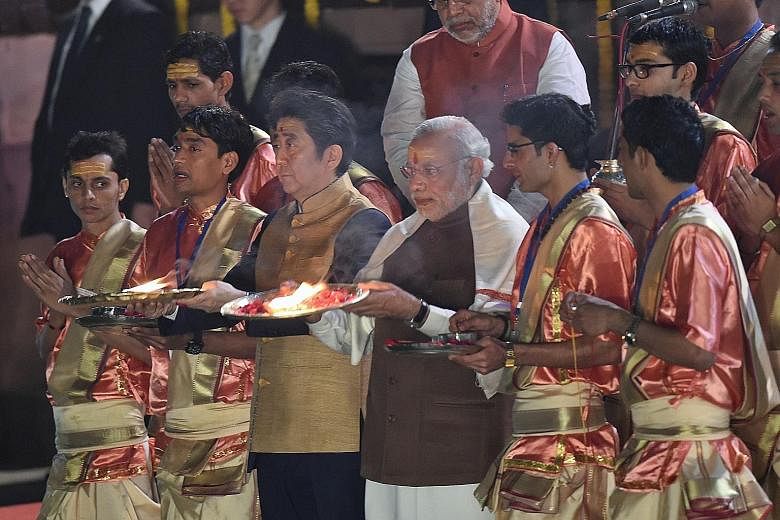Japan will build India's first high- speed rail link after the two nations inked 16 agreements yesterday - including one on civil nuclear energy cooperation - during Japanese Prime Minister Shinzo Abe's visit.
Indian Prime Minister Narendra Modi, who held talks with his Japanese counterpart and hosted him in his parliamentary constituency of Varanasi, showed little hesitation in calling Japan his country's closest economic partner. Mr Abe, in turn, declared a "new dawn in the relationship".
"Today, we have scaled new summits in our shared journey," Mr Modi told reporters at a joint press briefing with Mr Abe.
"The memorandum we signed on civil nuclear energy cooperation is more than just an agreement for commerce and clean energy. It is a shining symbol of a new level of mutual confidence and strategic partnership in the cause of a peaceful and secure world," he said.
Top officials said the nuclear agreement still needed "legal scrubbing" and finalisation of technical details, while Mr Abe will need to get parliamentary approval and navigate tough domestic laws. He said he expected India "to act responsibly in the use of nuclear energy".
Japan was among the countries that imposed economic and financial sanctions when India conducted nuclear tests in 1998 and has long been concerned about India's refusal to sign a series of international treaties, including the Nuclear Non-Proliferation Treaty.
In the past decade, ties between India and Japan have improved dramatically and Mr Modi has made strengthening ties with Japan a special priority since taking office last year.
The two countries' growing closeness is also seen to be driven by common concerns over the rise of China, particularly with Beijing flexing its muscles in territorial disputes in the East China Sea and South China Sea.
A joint statement pointed to cooperation between India and Japan in the Indo-Pacific, which experts see as sending a message to China.
"The two prime ministers reiterated their unwavering commitment to realise a peaceful, open, equitable, stable and rule-based order in the Indo-Pacific region... They pledged to work for peace, security and development of the Indo-Pacific region," said the statement.
While Japanese Foreign Ministry official Yasuhisa Kawamura said no aspect of India-Japan ties was aimed at a third party, Indian Foreign Secretary S. Jaishankar said the two prime ministers discussed the situation in the South China Sea.
"The message from the meeting is that unilateral action should be avoided and a code of conduct should be quickly established," said Mr Jaishankar.
On the high-speed rail link, Japan is seen to have stolen a march over China, which is conducting feasibility studies on two other corridors.
The Japanese will build a railway line between Mumbai and Ahmedabad and are hoping to build other links. Experts and officials believe the decision will kick-start a new era of railway modernisation in India. Tokyo will provide a US$12 billion (S$17 billion) package of soft loans and assistance for the rail link, which will slash the travel time from about eight hours to two.

